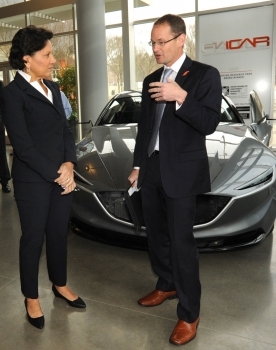Mar282014
Posted at 3:45 PM
Guest blog post by Dr. John Ballato, Clemson University vice president for economic development, and Kris Frady, director of operations for the Clemson University Center for Workforce Development
We had the privilege today of showing U.S. Secretary of Commerce Penny Pritzker the cutting-edge research and education that are helping South Carolina play a leading role in the nation’s economic revival.
She toured the Clemson University-International Center for Automotive Research (CU-ICAR) and then participated in a roundtable discussion with education and business leaders about how to develop a well-qualified workforce.
Her visit put a spotlight on the public-private partnerships that are helping create the next generation of engineers, scientists and technicians that America needs to remain competitive.
CU-ICAR in Greenville, S.C. is one of four Clemson University innovation campuses placed strategically across the state where businesses and communities need them most. It is an excellent example of what higher education, government and industry can accomplish when they work synergistically for the common good. It creates win-win partnerships.
As a land-grant university, Clemson has been helping grow business for decades. It started with farms, but now we’re applying the same model to automotive engineering, advanced materials, bioengineering, health, energy, the environment and genetics.
One great example of public-private partnership is the Deep Orange project at CU-ICAR. As part of their curriculum, students are assigned to build a concept car over two years. They do the same work as if they were working for a car company.
Deep Orange is now in its seventh generation. The secretary had a chance to see Deep Orange 3, which was sponsored by Mazda. The latest project is sponsored by Toyota Technical Center.
Also key to our success are the Clemson University Center for Workforce Development (CUCWD) and the Center for Aviation and Automotive Technology Education using Virtual E-Schools, which is an Advanced Technological Education Center funded by the National Science Foundation (NSF) .
A big part of what we do at CUCWD is bring people together. We break down the silos that have traditionally separated the P-12 system, industry and higher education.
Integrating the pieces helps put resources into the hands of the teachers that need them to create a highly qualified workforce. Those resources can range from engineering and science projects for elementary schools to advanced manufacturing curriculum for technical colleges.
We are driven by what industry leaders tell us they need. One of the concerns we keep hearing is that manufacturing has a branding problem.
Too many students and their parents are unaware of the opportunities offered in manufacturing. Factories aren’t the dirty, dingy places of years past. Modern manufacturing plants are high-tech, requiring a basic skill set that isn’t typically taught in high school.
The advanced manufacturing curriculum that we have begun distributing to technical colleges helps break down the stereotypes, while teaching the basic skills students need to land a 21st century manufacturing job. The curriculum includes three-dimensional illustrations and virtual reality simulations.
We appreciate the secretary taking time to see what the state has been doing and thank the U.S. Department of Commerce for its support. Our success is the nation’s success.


